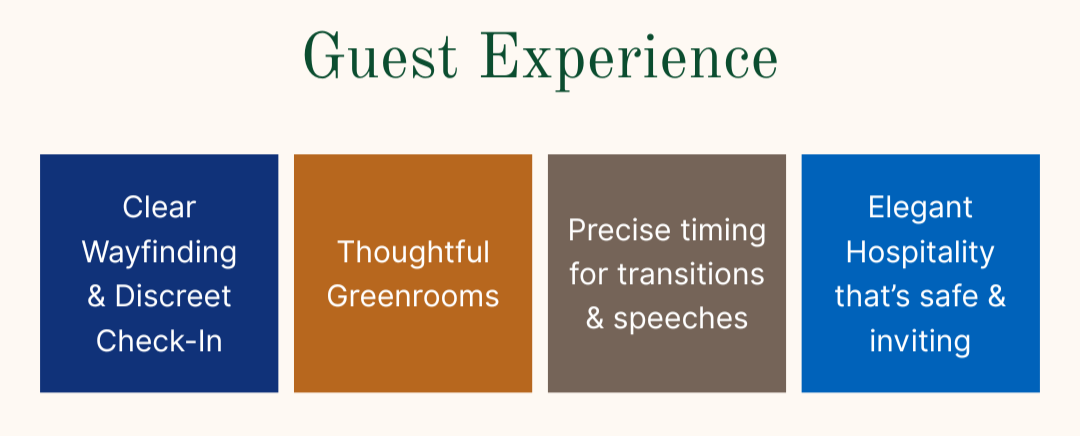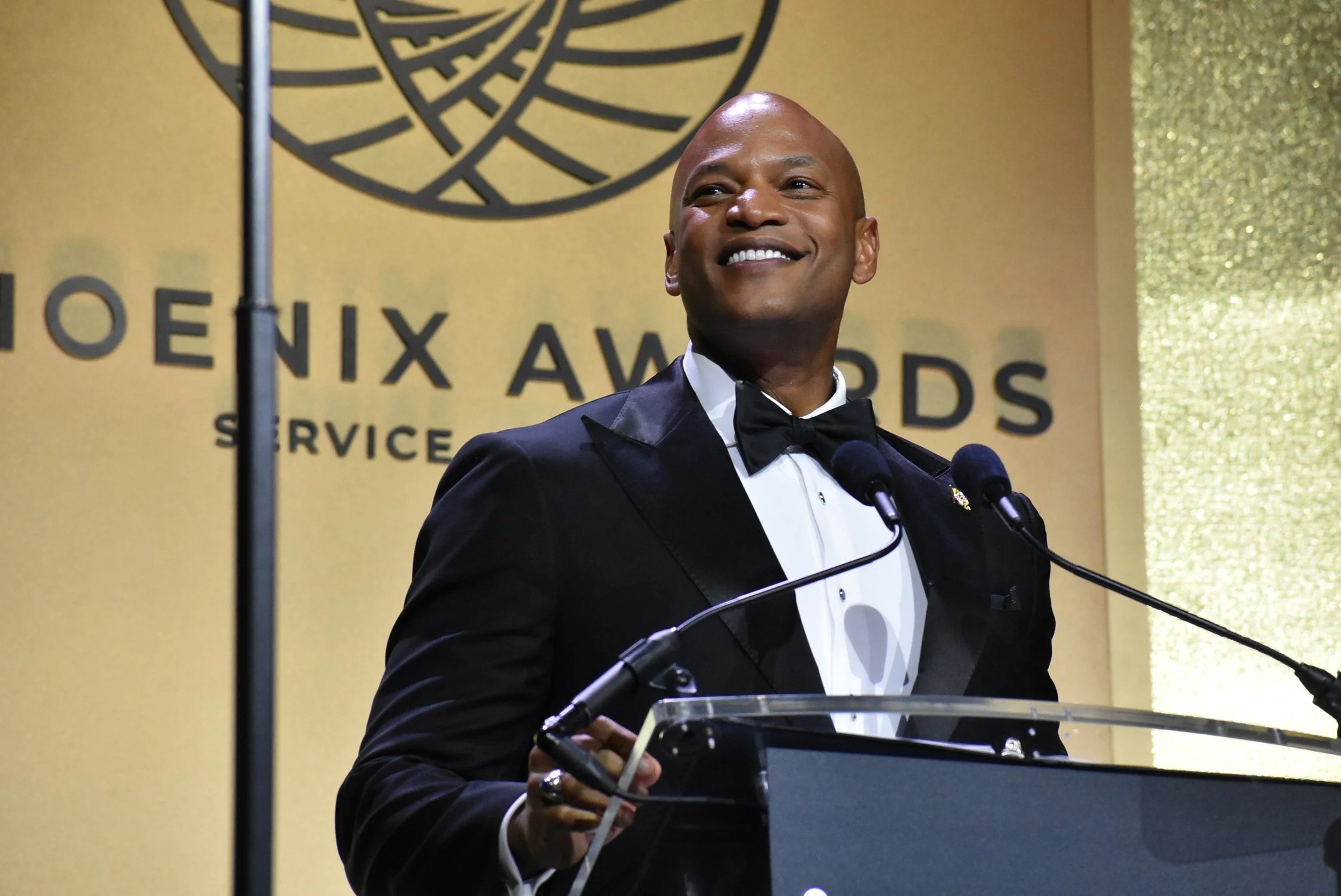Behind the Scenes: The Intricacies of Political and Diplomatic Event Planning
Political and diplomatic events are among the most complex undertakings in the event world. They are not just about décor or timelines—they’re about diplomacy, symbolism, and security at the highest level. Every movement, cue, and conversation is orchestrated to reflect precision and respect.
These events bring together world leaders, ambassadors, policymakers, and press—all under one roof, often in a live or global broadcast environment. The stakes are immense, the scrutiny intense, and the room for error nonexistent.
At Stratus Firm, we’ve had the privilege of managing and producing events that sit squarely in this space—from the Congressional Black Caucus Foundation’s Phoenix Awards Dinner, featuring the President and Vice President of the United States, to international security programs requiring cultural fluency and security collaboration.
Here’s a behind-the-scenes look at how political and diplomatic event planning comes together—where logistics meet diplomacy and flawless execution meets quiet grace.
Why Political and Diplomatic Events Demand Precision
Unlike corporate or social events, political and diplomatic gatherings operate under an entirely different set of expectations.
High Visibility, Zero Margin for Error
Every decision—down to the placement of a podium or the timing of applause—has implications for optics, media coverage, and public perception. A misstep in protocol or logistics can instantly become a headline.
Complex Layers of Authority
These events often include multiple layers of oversight: government agencies, event producers, venue security, sponsors, and media teams. Each has its own chain of command, priorities, and approval processes.
Symbolism in Every Detail
From seating charts to flag placement, political and diplomatic events carry symbolic weight. A guest’s position on stage or at a dinner table can signal alliances, hierarchies, or even political messages.
Precision isn’t optional—it’s fundamental. Every detail communicates something about the host’s competence, respect, and understanding of the occasion.
Balancing Security, Protocol, and Guest Experience
The true artistry of political and diplomatic event planning lies in balancing security and formality with warmth and hospitality.
Security Coordination: The Invisible Backbone
When high-ranking officials or heads of state are involved, the planning process often starts with security coordination. Teams from the U.S. Secret Service, Capitol Police, private security contractors, and local law enforcement all collaborate to:
Establish secure perimeters and access control points.
Conduct venue sweeps and background checks.
Design secure arrival and departure routes.
Oversee credentialing and badge protocols.
Each security team has its own procedures, and part of the planner’s job is to ensure all agencies are aligned—without compromising the guest experience.
Protocol: Respect and Order in Motion
Protocol governs everything from who enters a room first to how to display national flags. The Office of the Chief of Protocol and embassy liaisons are often involved in approving seating charts, order of remarks, and even small gestures like handshakes or toasts.
Proper protocol communicates professionalism and respect—it’s not about formality for formality’s sake.
Guest Experience: The Seamless Layer
While security and protocol dominate behind the scenes, the guest experience must feel effortless. That means:
Clear wayfinding and discreet check-ins.
Thoughtful green rooms for dignitaries.
Precise timing for transitions and speeches.
Elegant hospitality that feels safe yet inviting.
The best events achieve something rare: guests feel completely at ease, even when every movement is choreographed down to the second.
Managing High-Level Stakeholders and Dignitaries
Behind every political or diplomatic event is a complex network of partners, aides, and representatives—each with their own priorities.
The Stakeholder Matrix
Events of this scale typically involve:
Government agencies (for oversight, security, or representation)
Embassies and international delegations
Sponsors or host organizations
Media teams managing live coverage
Production crews responsible for staging, lighting, and sound
Each must be consulted, coordinated, and kept informed—often across time zones and languages. A single miscommunication can derail months of preparation.
Working with VIP Advance Teams
Political and diplomatic figures almost always have advance teams—specialized staff who arrive early to oversee logistics, inspect venues, and coordinate with hosts. Their approval is critical.
Building a strong relationship with these teams earns trust and ensures smoother collaboration on event day.
Managing Expectations with Diplomacy
Stakeholders may have conflicting priorities—security may prefer tight movement control, while communications teams want open photo opportunities. Successful planners navigate these tensions diplomatically, finding creative solutions that satisfy all parties.
Venue Selection and Logistical Challenges
Choosing the right venue for a political or diplomatic event is both an art and a science. It’s not just about beauty or capacity—it’s about control, security, and symbolism.
Security First
A suitable venue must accommodate secure entry points, controlled perimeters, and command centers for protective details. Venues with multiple exits, underground parking, or complex layouts can pose challenges.
Before contracts are signed, site visits are conducted with security teams to assess everything from motorcade staging areas to emergency egress routes.
Symbolism and Accessibility
A venue’s reputation and architecture often contribute to the message of the event.
Government buildings convey authority and tradition.
Museums or cultural spaces symbolize collaboration and shared values.
Convention centers accommodate global summits with scale and flexibility.
Accessibility—both physical and geographic—is equally vital. International guests must be able to arrive easily and navigate the venue comfortably.
Contingency Planning
Logistical readiness extends to every “what if.”
Backup generators for power.
Alternate venues for weather or security issues.
Redundant communication systems for staff and media.
When the world is watching, a contingency plan isn’t a backup—it’s a necessity.
Cultural Sensitivity and International Protocol
Political and diplomatic events are as much about relationship-building as they are about programming. Cultural awareness is non-negotiable.
Learn more about domestic and international protocol from Leslie Lautenslager’s book “My Time with General Colin Powell: Stories of Kindness, Diplomacy, & Protocol. Purchase the book here: Amazon
Respect for Customs and Traditions
From greetings to gift exchanges, cultural customs vary widely. For instance:
In some cultures, handshakes are replaced by bows or nods.
Certain flowers or colors may have specific meanings.
Dietary restrictions tied to religion or tradition must be respected.
Missteps, even small ones, can inadvertently offend or signal insensitivity.
Language and Communication
Translation and interpretation services are critical for inclusivity. Bilingual signage, multilingual materials, and skilled interpreters make events more welcoming for international guests.
Inclusivity and Representation
Beyond cultural respect, planners must consider gender balance, regional representation, and accessibility. Diplomacy thrives when everyone feels seen and included.
At Stratus, we often collaborate with embassy teams and cultural attachés to ensure every element—from music to menu—is thoughtfully aligned with the guest composition.
Case Studies: High-Stakes Events in Action
Congressional Black Caucus Foundation’s Phoenix Awards Dinner
The Phoenix Awards is one of the most prestigious political galas in the United States, hosting the President, Vice President, Cabinet members, and thousands of leaders from around the world.
Stratus Firm played a critical role in managing logistics, production, and security coordination with the U.S. Secret Service and venue operations at the Walter E. Washington Convention Center for the 2024 event.
Challenges include:
Managing overlapping security jurisdictions.
Designing crowd flow for 3,000+ guests while maintaining access control.
Timing rehearsals around presidential movements.
The event’s success each year comes down to months of behind-the-scenes collaboration, rehearsals, and calm under pressure.
Embassy and Diplomatic Receptions
For embassy-level events, Stratus often integrates protocol adherence with cultural storytelling. That means:
Aligning décor and programming with national identity.
Coordinating multilingual signage and simultaneous translation.
Managing guest lists with strict precedence and seating hierarchies.
Each event is an exercise in diplomacy through design—showcasing respect, partnership, and shared celebration.
Lessons Learned from Behind the Scenes
Every high-security or high-profile event brings its own lessons—often learned quietly behind the curtain.
1. Preparation Is the Real Performance
By the time guests arrive, 95% of the event’s work should already be done. Walk-throughs, briefings, and scenario rehearsals are essential to eliminate surprises.
2. Collaboration Is Everything
No single team can manage these events alone. Success depends on cooperation between producers, government agencies, and venue partners who respect each other’s expertise.
3. Flexibility Under Pressure
Despite the best plans, things change: a delayed motorcade, an unscheduled press opportunity, or a last-minute change in speaking order. The ability to adapt gracefully and invisibly is the hallmark of a skilled event team.
4. Details Are Diplomacy
From escort cards to lighting temperature, details communicate values. Precision signals respect, competence, and care — all vital in political and diplomatic settings.
5. Calm Is Contagious
In high-security environments, nerves run high. A composed team sets the tone for everyone else — from Secret Service to catering staff.
The Art of Political and Diplomatic Planning
Political and diplomatic event planning is more than a logistical challenge — it’s a form of diplomacy in itself. It requires the rare ability to make the complex feel simple, the high-security feel hospitable, and the ceremonial feel human.
Behind every smooth handshake and flawless photo op lies an intricate web of communication, protocol, and precision. The planners, coordinators, and producers who bring these moments to life operate largely unseen — yet their work defines the success of every headline-making event.
At Stratus Firm, we believe political and diplomatic event production is an art form. By uniting design thinking, logistical rigor, and cultural intelligence, we create experiences that uphold integrity, inspire trust, and reflect the highest standards of professionalism.
Ready to bring diplomatic precision to your next event?
Partner with us! We’re a team trusted by leaders, agencies, and institutions for high-stakes event production.
-
Political and diplomatic events operate under a unique mix of security, symbolism, and protocol. Unlike corporate or social gatherings, these events involve multiple government agencies, international delegations, and media scrutiny. Every decision—from flag placement to motorcade timing—carries meaning and must align with established protocol while maintaining guest comfort and composure.
-
Security coordination begins months in advance. Stratus works hand-in-hand with the U.S. Secret Service, Capitol Police, local law enforcement, and venue security to establish secure perimeters, credentialing systems, and controlled guest flow. Our role is to integrate these protocols seamlessly into the guest experience—ensuring that safety feels invisible but absolute.
-
Stratus collaborates directly with embassy liaisons, protocol officers, and cultural attachés to align every element of the event—from seating charts to ceremonial gestures—with international standards of respect. We also ensure multilingual signage, inclusive representation, and culturally appropriate hospitality so every guest feels both honored and at ease.
-
We believe diplomacy and hospitality can—and must—coexist. Our approach integrates discreet check-ins, intuitive wayfinding, and thoughtful green rooms that allow dignitaries to feel relaxed without compromising safety. Guests should never feel the weight of logistics behind the scenes; instead, they experience smooth transitions and an atmosphere of confidence and care.
-
Stratus Firm has earned the trust of top-tier clients—from federal agencies to global NGOs—through a proven track record of precision, discretion, and poise under pressure. Our team’s expertise spans complex security collaboration, VIP management, and flawless live execution. We bring the calm, coordination, and cultural intelligence that high-profile diplomacy demands.





